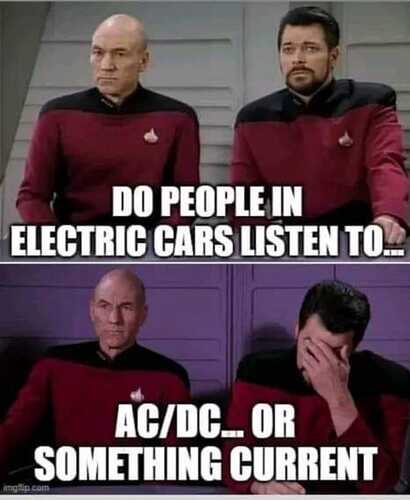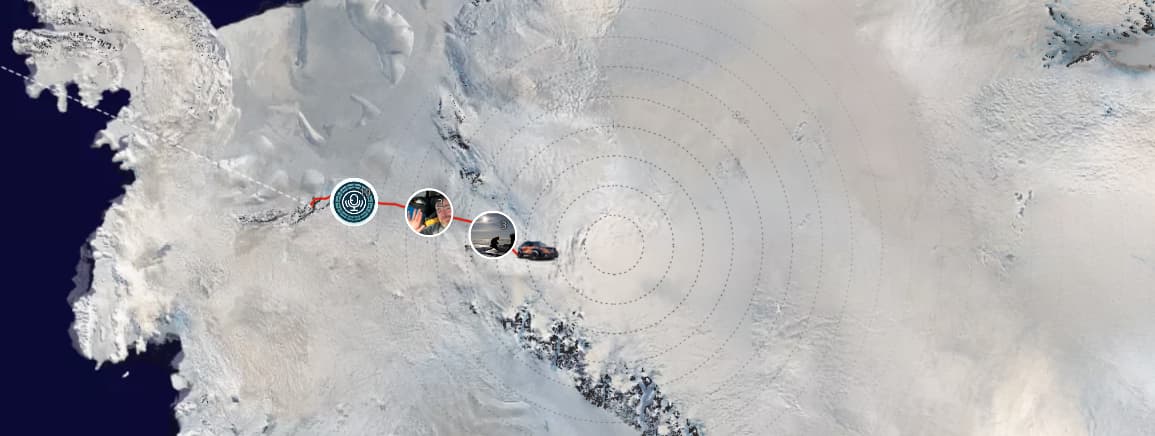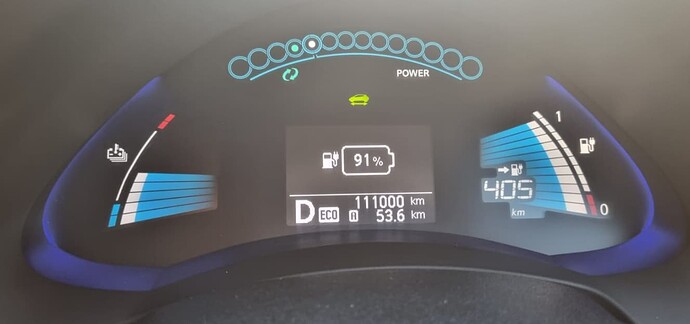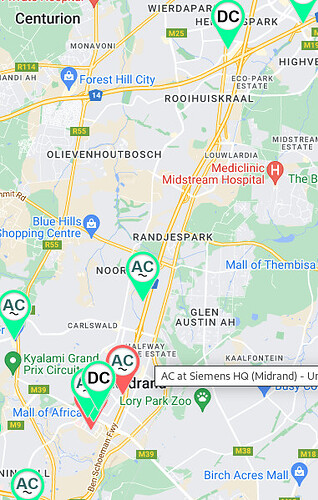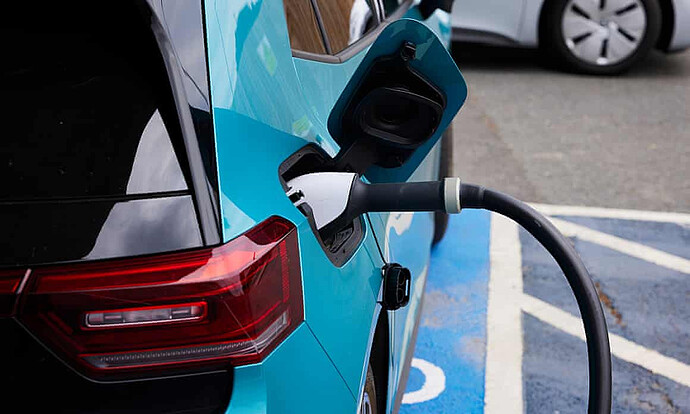![]()
Something very interesting I only caught up to right at the end. A couple from the UK (Aberdeen) is doing a trip in an EV (Nissan Ariya), from the North pole to the South.
They are ALMOST at the South Pole. This morning they posted that they are 2260m above sea level, and according to the map about 2 degrees away (no idea how far that is in distance) from the pole.
At the North Pole they used a wind turbine on a trailer (along with Solar and Diesel), but right now they use a mixture of Diesel and solar.
Yo, I really REALLY like those tires!
BF Goodrich KO wheels. 34 inchers I believe.
Let me put this here, as it applies to EVs in the full sense … battery replacement, the real thing in SA.
Just saw an advert for a Nissan Leaf being for sale.
Still has about 60km on a charge … perfect nick otherwise.
Quotes for new Batt:
Nissan, all in: ± R235k for stock standard Nissan pack via Nissan.
Repacked bank: ± R220k for 260-400km range depending on KWH installed - with software conversion.
Do it all over bank: 40kWh / 350km ±R175k - with software conversion.
The above is what I noted, the owner has the exact details.
I guess about R360k all-in and you have an EV for 10 years again.
PM me if someone wants the contact name.
The South Pole team is “one charge” away from the pole, as of earlier this morning… ![]()
In my book, if the shell of the car is 100k or not much more, it is worth it. A new pack from the manufacturer then puts you a tad over 300k. Ideally you want to end up with something that can resell for about what you put into it. I’ve never seen anyone sell the shell for that little though.
Maybe if you consider the degraded pack in the car’s second hand value (a degraded cell could still be used for something else), then that gives you a bit more room.
Then, I assume this is the 1st gen Leaf with no active battery cooling.
Is there someone in SA that does this? I know that in Europe, there are people who do it. You send them your car, they send it back with a new pack. And you can have it for around 6000 to 8000 Euro… which in ZAR is a lot, but in Euro that’s actually pretty fair. If that option was available in SA, I would totally have a 94Ah swapped into the i3!
Another cheap i3. This one with only 68k km. But be careful, it looks as if the passenger side mirror is taped up. And those mirrors are not cheap. If it is just the cap, that’s not too bad. If it is the bracket on the door, it’s a bit worse.
https://www.autotrader.co.za/car-for-sale/bmw/i3/edrive/27319219
From Nissan the OEM battery: R115k incl VAT. But to get stock is a challenge.
Apparently yes, in the Gauteng area. And you keep the batt, it seems. You can get a 63kWh one from NZ, here in SA.
I think this is a pic sent to me, of that 63kWh bank installed.
Leaf was for sold for R150k … say R115k for new batt = R265k.
So based on what I learned this morning, that BMW is way too expensive. ![]()
Another story I heard this morning. My Cousin told me, he had a batt replaced for a 12yo Leaf, so after the batt, it was serviced:
- Had the OEM brake shoes still in.
- Cooling water (?) was replaced.
- Brake fluid replaced.
- 12v battery replaced.
… and not a rattle anywhere, perfect body, my cousin told me. He drove the car to test it.
@Sarel.Wagner , saw this this morning, boosts for SA production maybe?
That’s a very reasonable price for a car that is as good as new. I assume it is a 1st gen.
They are, in my subjective opinion, a little ugly. I far prefer the 2nd gen’s look. Is it 100k or more uglier? Probably not.
But also, they stuck with passive cooling even in gen2, as well as the ChaDeMo charge connector (no CCS2), which are significant drawbacks. Probably not an issue if it is going to be your local runaround though.
The active cooling and the fast charging combined with active battery cooling is probably enough to justify the extra price of the BMW.
That looks like a great car - if it comes in at a decent price…
— change topic —
Just finished my first long trip in the XC40, and it was relatively painless. 3,000+km (about 200km on dirt / farm tracks). Only once had to wait 20 minutes when a charger was busy (another XC40, unsurprisingly) over the entire trip, over the busy Christmas period.
Charging network is quite good. Except for Gauteng - which does not have a single highway charger. Need substantial detours into Pretoria/Jhb for charging. But most chargers are 60kW - which is tedious. About 1 hour for a typical charge. The one 150kW charger on route was a dream - in and out in 20 minutes. There is another network going up as we speak, which should have 150kW chargers every 200km on all major routes within the year. Which should make things even better.
The only real drawback was the continuous stream of questions whenever you stop at a charger ![]() .
.
I want one.
AFAIK there are charging points on the N1 round about Midrand. Nicely positioned (or so I think) for those commuting between Centurion and Johannesburg. With a coffee shop so you can get your caffeine fix and check your emails whilst the car is charging.
What’s the cost of a charge?
All of those are in offices/shops off the highway. And all but Mall of Africa are ludicrously slow - so you will need more than coffee and emails if you want to charge there.
Price… That is one thing - fast chargers are very expensive in SA. R7.35/kWh, or around R1.75/km (vs R0.70/km on Eskom).
I was thinking about a filling station/refreshments (what they’d call “services” in the UK. I remember seeing the “charging point” signs), though it was a while back and these days when I go to Centurion for work I catch the train.
Thanks for the information @justinschoeman. It’s very interesting to hear from people who actually own and use an EV.
Family if mine has a farm in the Northern Cape, where someone is negotiating for land rights to put up such a charging station (with the small solar farm it needs). They are still hashing out the detail, but the offer on the table to the farmer is 1) 5% revenue share on the charging, 2) option to buy, at less than utility pricing, any excess energy produced by the solar farm.
The company is called ZeroCC.
The project officially kicked off a year ago, which means they are already a year behind.
But it seems they are quite serious about doing this. And if they succeed… man will that be a giant victory for renewable energy. Because we’ll be offloading all that energy use from the petrol/diesel network, without moving it to the electricity network.
They are also talking about creating 82 000 job opportunities, attracting 100 billion to rural areas, 187 billion saved in Forex by not buying oil, creating a market of 30 billion in SA for buying renewable energy, etc.
Currently, they expect that 13% of new car sales will be EV by 2026. Personally I suspect that will lag a year behind (because this is SA), but that is still an impressive market you cannot ignore, just 3 years away.
I have the documents, I just am not sure if I can publicly share them.
Support independent journalism in 2024 Support us ![]()
![]()

First Thing: White House gives major boost to electric vehicle charging points
Biden administration unveils $623m in funding amid concern that transition to zero-carbon transportation not keeping pace with climate crisis. Plus, Ai Weiwei on AI art
 The funding will be distributed in grants for dozens of programs across 22 states. Photograph: Christopher Thomond/The Guardian
The funding will be distributed in grants for dozens of programs across 22 states. Photograph: Christopher Thomond/The Guardian
Nicola Slawson
Good morning.
Joe Biden’s administration has unveiled $623m in funding to boost the number of electric vehicle charging points in the US, amid concerns that the transition to zero-carbon transportation is failing to keeping pace with goals to tackle the climate crisis.
The funding will be distributed in grants for dozens of programs across 22 states, such as EV chargers for apartment blocks in New Jersey, rapid chargers in Oregon and hydrogen fuel chargers for freight trucks in Texas. In all, it is expected the money, drawn from the bipartisan infrastructure law, will add 7,500 chargers to the US total.
“We are building the charging network to win the EV race,” said Pete Buttigieg, the US transportation secretary. “The electric vehicle revolution isn’t coming, it is here. I take very personally the importance of the fact that America led the world in the automotive revolution. Now we are in the midst of a second automotive revolution, it’s critical America do so once more.”
- How many electric charging points are there in the US? There are about 170,000 electric vehicle chargers in the US, a huge leap from a network that was barely visible before Biden took office. The White House has set a goal for 500,000 chargers to help support the shift away from gasoline and diesel.
